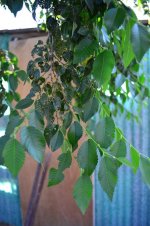B
BlueJayWay
GC
Here's what I've devolved to on the rooting process - ain't much.
1 gallon of clear water
1 oz. of BioAg Fulvic acid
2 oz. Aloe vera extract
1 tsp. Dyna-Gro Pro-TeKt
I take the RapidRooters (the brand - not a knockoff not that it matters a single iota) and soak them for 'some period of time' which is usually when I remember that they're still sitting in the solution.
I take them and 'gently' squeeze out excess water/solution.
Take a 'glass' glass with the same solution and stick the cuttings in there and let them sit overnight. Next morning I stick them into the plugs, mist the inside of the clear dome and put them next to a sliding glass door.
That's it....
Crosseyed and Painless - Talking Heads
CC
I was already using bioAg's fulvic acid in my cloning solution and since i've picked up the Aloe I had to try this one. Showing roots in 6 days, 9 of the 21 cuttings by 7 days and today 13 of 21 @ 8 days = I'm Happy!
I had a quirky method (but worked) for cloning and this certainly simplifies it, I'm guessing it's the Aloe that keeps them "perkier" through the entire rooting process? Since that's my previous missing variable, or a combo affect I suppose.
Hats Off (again) Cootz!



 of certain plant meals before adding a byproduct of whats found in quality compost & casting...
of certain plant meals before adding a byproduct of whats found in quality compost & casting...
